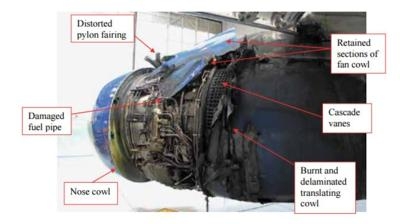Thu, Jul 16, 2015
Engine Cowling Doors Were Left Unlatched, Leading To The Incident
The U.K. Air Accidents Investigation Branch (AAIB) has released a report stemming from a 2013 incident in which the the fan cowl doors from both engines on an Airbus A320 detached from the aircraft, damaging the airframe and a number of aircraft systems.

As a result, fuel leaked from one of the engines and caught fire while the plane was in flight.
According to the report, the fan cowl doors both separated from the airplane during takeoff. The flight crew elected to return to Heathrow and on the approach to land on Runway 27R, leaking fuel from a damaged fuel pipe on the right engine ignited and an external fire developed. The left engine continued to operate satisfactorily throughout the flight. The right engine was shut down promptly, reducing the intensity of the fire, and the aircraft landed safely. It was brought to a stop on the runway and the emergency services were quickly in attendance. The fire in the right engine was extinguished and the passengers and crew evacuated via the emergency escape slides on the left side of the aircraft.
The investigation determined that a maintenance error had led to the fan cowl doors on both engines being left unlatched following scheduled overnight maintenance on the aircraft. The unlatched condition of the fan cowl doors was not identified prior to the aircraft’s departure the next morning. A number of organisational factors were contributory to the maintenance error. The operator has since taken action to address these issues.
This, and numerous other similar events, shows that Airbus A320-family aircraft have a history of departing with the fan cowl doors unlatched. It is also evident that, in practice, the flight crew walk-around inspection is not entirely effective in detecting unlatched fan cowl doors and therefore a design solution is necessary. Enhanced methods of detection through design solutions are being considered by the aircraft manufacturer.
As a result of this investigation, five Safety Recommendations were made concerning: fatigue risk management; fan cowl door position warnings; fan cowl door certification requirements; in-flight damage assessments by cabin crew and aircraft evacuation procedures.
(Image from AAIB Report)
More News
Touchdown Zone Lighting Two rows of transverse light bars located symmetrically about the runway centerline normally at 100 foot intervals. The basic system extends 3,000 feet alon>[...]
“Discovery and innovation are central to our mission at Virgin Galactic. We’re excited to build on our successful record of facilitating scientific experiments in subor>[...]
"We are reaching out to you today on behalf of the Popular Rotorcraft Association because we need your help. We are dangerously close to losing a critical resource that if lost, wi>[...]
UAS Traffic Management (UTM) The unmanned aircraft traffic management ecosystem that will allow multiple low altitude BVLOS operations and which is separate from, but complementary>[...]
Aero Linx: Society of Aviation and Flight Educators (SAFE) SAFE is a member-oriented organization of aviation educators fostering professionalism and excellence in aviation through>[...]
 ANN's Daily Aero-Term (05.02.24): Touchdown Zone Lighting
ANN's Daily Aero-Term (05.02.24): Touchdown Zone Lighting Aero-News: Quote of the Day (05.02.24)
Aero-News: Quote of the Day (05.02.24) Aero-News: Quote of the Day (05.03.24)
Aero-News: Quote of the Day (05.03.24) ANN's Daily Aero-Term (05.03.24): UAS Traffic Management (UTM)
ANN's Daily Aero-Term (05.03.24): UAS Traffic Management (UTM) ANN's Daily Aero-Linx (05.03.24)
ANN's Daily Aero-Linx (05.03.24)



